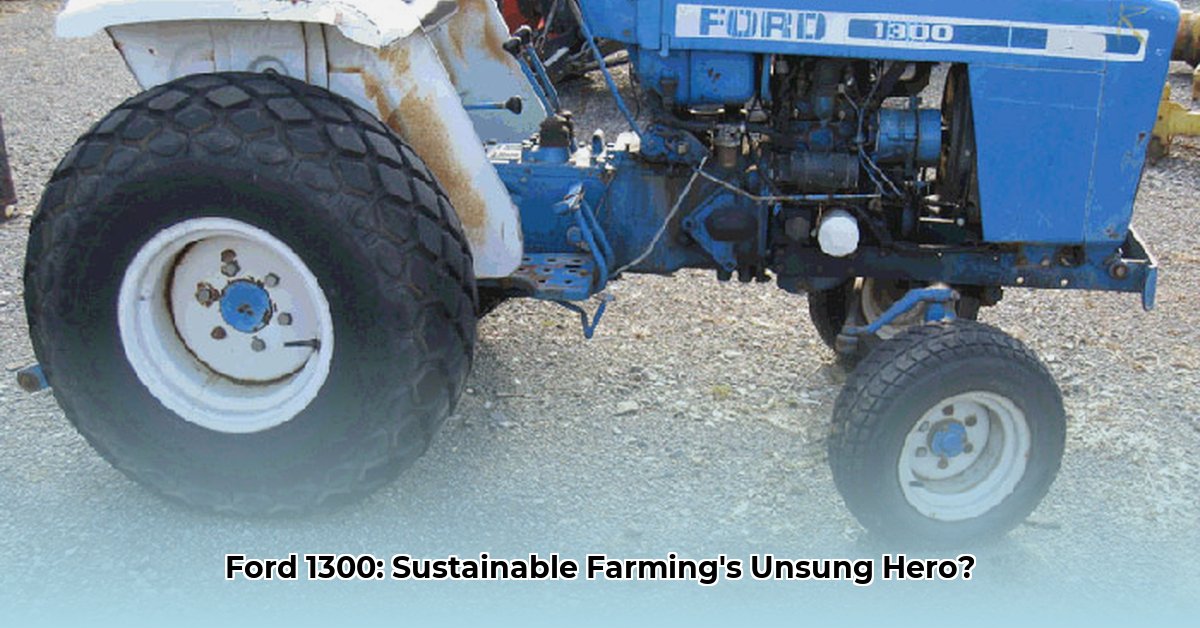
The Ford 1300 tractor, prevalent on farms during the 1970s and 1980s, provides a valuable case study for examining sustainability in agricultural technology within its historical context. While not meeting contemporary standards, analyzing its strengths and weaknesses offers crucial insights into the evolution of sustainable farming practices. For a comparison, see information on another classic tractor like the 1949 Ford 8N.
Fuel Efficiency: A Comparative Perspective
A defining characteristic of the Ford 1300 was its relatively high fuel economy for its era. Its smaller fuel tank (approximately 5.8 gallons) and efficient engine design minimized fuel consumption compared to larger tractors of the time. This translated to reduced financial strain on farmers and lower greenhouse gas emissions. However, the absence of precise carbon footprint calculations in the 1980s necessitates further research comparing the Ford 1300's fuel use to both contemporary and earlier farming methods. Preliminary analyses suggest favorable gas usage, but a definitive conclusion requires comprehensive comparative studies. Did this fuel efficiency truly contribute to sustainability, considering the limitations of available data?
Adaptability and Multi-Functionality: Minimizing Equipment Needs
The Ford 1300’s compact size belied its versatility. A wide array of attachments—mowers, snow plows, front-end loaders, and even backhoes—expanded its functionality, reducing the need for multiple specialized machines. This minimized the environmental footprint associated with manufacturing, transportation, and disposal of additional equipment. However, further research is needed to quantify the extent of these benefits, considering the manufacturing processes involved in producing the attachments themselves. Could the overall environmental impact still have been lower with a more specialized, yet more fuel-efficient, machine?
Power and Performance: Balancing Efficiency with Capability
The Ford 1300’s 15.3 horsepower engine, while fuel-efficient, limited its power. This occasionally necessitated increased manual labor, potentially offsetting some of the gains achieved through reduced fuel consumption and equipment usage. Considering the prevalence of smaller farms in the 1970s and 1980s, the 1300's capabilities were well-suited to the prevalent scale of operation. However, modern small-scale farmers might require more powerful equipment for optimal sustainable practices. What is the ideal balance between fuel efficiency and power output in modern sustainable farming?
Manufacturing, Disposal, and Lifecycle Analysis: Unanswered Questions
Critical knowledge gaps exist regarding the Ford 1300's full lifecycle sustainability. Information on the environmental impact of its manufacturing—material sourcing, production processes, and energy usage—remains scarce. Similarly, data on end-of-life management—recycling potential and landfill impact—is limited. Addressing these knowledge gaps is crucial for a complete sustainability assessment. Without this data, any complete environmental impact statement is incomplete and potentially misleading. How can we improve data collection and analysis for vintage farm equipment to better understand their historical environmental impact?
A Historical Perspective and Modern Sustainability
The Ford 1300 exemplifies the agricultural technology of its time, but falls short of current sustainable agriculture standards. Modern sustainable agriculture emphasizes precision farming, reduced fossil fuel dependence, and careful lifecycle management of equipment. The Ford 1300, while innovative for its era, highlights the substantial advancements in sustainable practices and supporting technologies. What lessons can be learned from the Ford 1300 and applied to the design and implementation of future sustainable agricultural technologies?
Stakeholder Perspectives and Future Research Directions
The impact of the Ford 1300 extends across multiple stakeholders. Future research should focus on obtaining a more complete picture of its environmental impact.
| Stakeholder | Short-Term Research Focus | Long-Term Research Focus |
|---|---|---|
| Small-Scale Farmers | Alternative fuel exploration for existing equipment | Investigation of modern fuel-efficient, compact tractors |
| Agricultural Historians | Documentation of the 1300's role in small-farm mechanization | Lifecycle assessments of similar vintage machines |
| Equipment Manufacturers | Sustainability analysis of past designs | Development of new, sustainable compact tractors |
The Ford 1300's legacy calls for continued investigation into its manufacturing processes, disposal methods, and overall environmental impact compared to other technologies of its era to inform future sustainable farming practices. What novel research methods could enhance our understanding of the sustainability of historically significant agricultural technology?